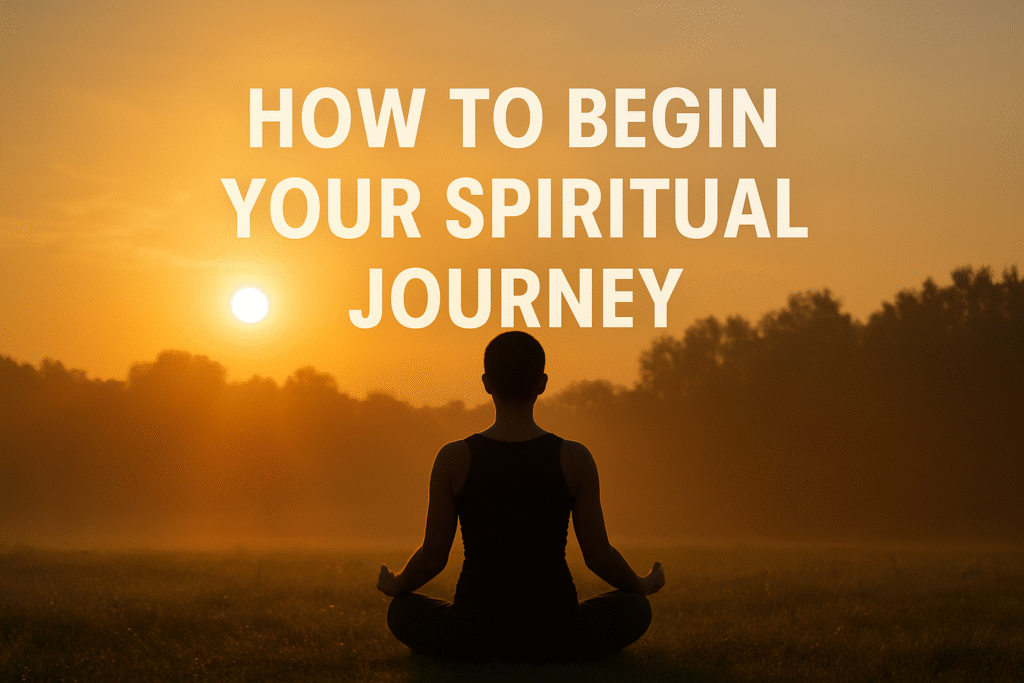
Modern life often feels like a never-ending cycle of stress, responsibilities, and distractions. Yet deep inside, many of us crave something more—peace, clarity, and a sense of higher purpose. That’s where a spiritual journey begins.
Starting a spiritual practice doesn’t mean you need to change your beliefs, follow strict rituals, or retreat from society. Instead, it’s about slowing down, listening to your inner voice, and living in alignment with your true values.
If you’ve been wondering how to start your spiritual journey, this beginner-friendly guide offers simple steps to help you connect with yourself and the world around you.
1. Define What Spirituality Means to You
Spirituality is personal—there’s no single definition. For one person, it might mean prayer and connection to a higher power. For another, it could be meditation, self-awareness, or living with compassion.
Before taking any steps, pause and ask: What does spirituality look like in my life? The clarity you gain will guide the path ahead.
2. Spend Time in Self-Reflection
The journey inward is the foundation of all spiritual growth. Give yourself quiet moments to reflect on questions like:
- What truly makes me feel at peace?
- Which habits or patterns hold me back?
- What values do I want to live by each day?
Writing your thoughts in a journal helps you see patterns and track your progress over time.
3. Practice Mindfulness and Meditation
Meditation doesn’t have to feel overwhelming. Start small—just 5 minutes of focused breathing can make a difference. Allow your thoughts to come and go without judgment.
Mindfulness is simply being present. Whether you’re eating, walking, or sipping tea, notice the details of the moment. These small acts bring calmness and awareness into daily life.
4. Try Different Spiritual Practices
There are many paths to spirituality, and you don’t have to limit yourself. Some practices to explore include:
- Yoga or breathwork for balance and clarity
- Prayer or mantras for grounding
- Sacred texts or inspiring books for guidance
- Spending time in nature to reconnect with the universe
Experiment and choose what feels authentic. Your journey should reflect you.
5. Create a Positive Environment
The energy around you influences your spiritual growth. Limit exposure to negativity—whether it comes from toxic relationships, draining news, or cluttered spaces.
Instead, invite positivity: spend time with uplifting people, curate inspiring content, and create a peaceful corner at home for reflection or meditation.
6. Stay Patient and Consistent
Spiritual growth doesn’t happen overnight. Some days will feel inspired, while others may feel stagnant—and that’s okay. Consistency matters more than perfection. Even small daily practices add up over time.
7. Embrace Gratitude and Kindness
Spirituality deepens when you extend it outward. Practice kindness—help a friend, smile at a stranger, or volunteer when you can.
Along with kindness, cultivate gratitude. Each day, write down three things you’re thankful for. Gratitude shifts your mindset and helps you focus on life’s blessings rather than its challenges.
Starting your spiritual journey is less about reaching a destination and more about embracing the process. With reflection, mindfulness, gratitude, and openness, you’ll slowly discover a path that feels meaningful and unique to you.
Your journey doesn’t need to look like anyone else’s. It’s about living with greater awareness, peace, and purpose—one step at a time.
Frequently Asked Questions (FAQs) on Starting a Spiritual Journey
1. What is the first step in a spiritual journey?
The first step is self-reflection. Spend time understanding what spirituality means to you and what you hope to experience. Once you have clarity, you can begin with simple practices like meditation, journaling, or gratitude.
2. How can beginners practice spirituality every day?
Beginners can start small by setting aside 5–10 minutes daily for mindfulness or meditation. Other easy habits include keeping a gratitude journal, practicing kindness, and spending quiet time in nature. Consistency is more important than intensity.
3. Do I need to follow a religion to be spiritual?
No, spirituality is not limited to religion. While some people connect through religious practices, others find spirituality in mindfulness, personal growth, service, or simply living with awareness and compassion.
4. What are some signs that I am on the right spiritual path?
You may notice greater inner peace, improved patience, less attachment to negativity, and a deeper sense of gratitude. Over time, you’ll feel more connected to yourself and aligned with your values.
5. How long does it take to grow spiritually?
There’s no set timeline. Spiritual growth is a lifelong process, and everyone’s journey is unique. The key is to stay patient, consistent, and open to learning along the way.
Final Thoughts
Your spiritual journey is not about achieving perfection—it’s about progress, awareness, and growth. By taking small daily steps, you’ll create a life filled with meaning, peace, and purpose.